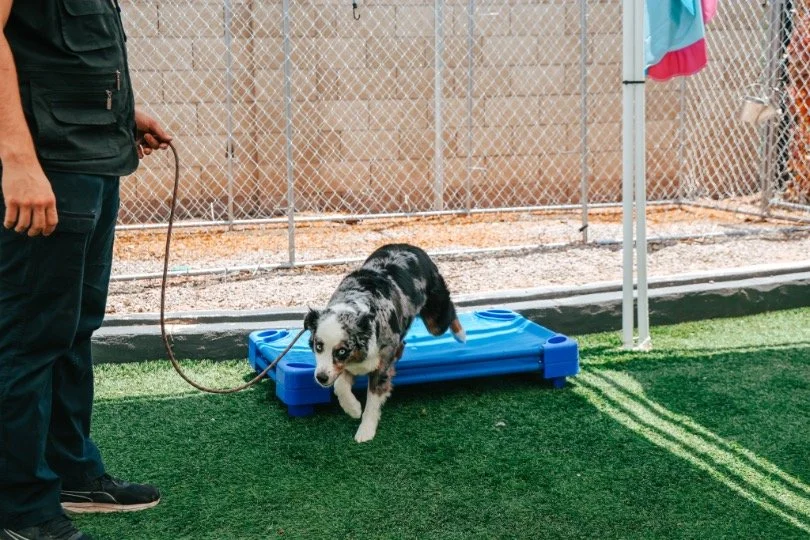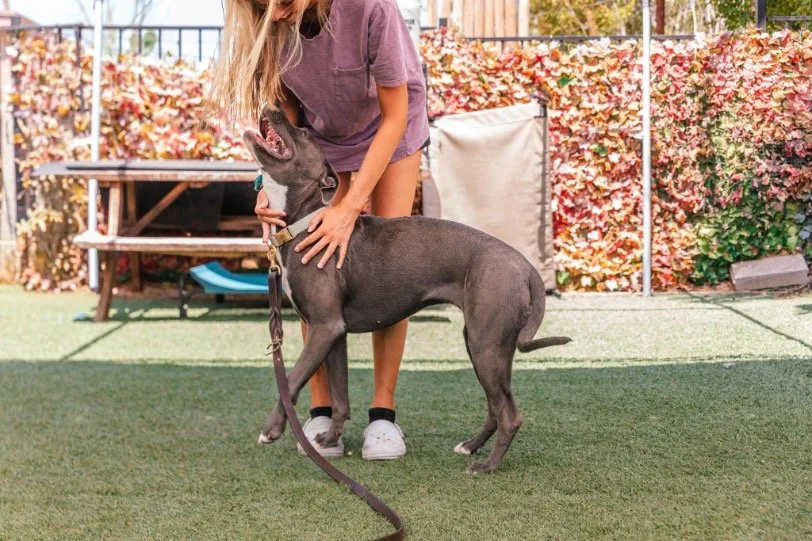Red Flags in TikTok Dog Training: What Real Trainers Want You to Know
If you have a dog, you’ve probably opened TikTok or Instagram and, within a few minutes, seen a viral “hack” or “quick fix” dog training advice. Many social media “trainers” claim to have the secret key to fix leash-pulling in one walk or encourage you to let your dog off-leash before they’re ready. It sounds great. It seems easy. Until it doesn’t work for your dog.
Phantom K9 Training has worked with dogs and handlers across the globe, and we’ve heard many frustrated owners express how crazed TikTok training has made them.
If you’re overwhelmed by social media dog training content, you're not alone. In our blog, we’re walking you through how to spot dog training red flags, what to look for in legit dog training tips, and how to find advice that actually works for your dog.
Why Social Media Training Advice Is So Popular
Platforms like TikTok and Instagram prioritize engagement, not accuracy. That results in non-credible people posting in quick, dramatic videos without context.
These clips often go viral because they appeal to emotion over education. Complex behavioral problems are simplified because they offer instant results. Sometimes they mean well, but it’s important to tell the difference between influencers and reputable trainers.
Once TikTok trainers go viral, it’s harder for well-informed content to compete… even when the advice is harmful.
Influencer vs. Expert: How to Tell the Difference
It’s so easy to fall into the trap of mistaking visibility for credibility. Not all trainers with huge followings or professionally shot videos are qualified to train your dog. Here’s how you can begin to spot the difference between someone seeking views and a dog trainer you can trust:
Influencer Dog Trainer
Posts for views, followers, and engagement
Relies on trending audio, dramatic transformations, or “quick fixes”
Rarely shows full-length sessions or long-term progress
Avoids complex cases or serious behavior issues
Speaks in absolutes like “this works for every dog”
Expert Dog Trainer
Has real-world training experience with a variety of dogs and clients
Shares educational content rooted in behavior, not trends
Focuses on long-term progress, not just flashy before/after clips
Explains methods, encourages questions and conversation, and teaches the “why” behind techniques
Delivers consistent, proven results
The bottom line is, if someone looks like they’re training for the camera instead of for the dog, trust your gut. An influencer wants to entertain. A real trainer wants to help.
You and your dog deserve a trustworthy trainer who’s not just working with pups to go viral.
Red Flags in Online Dog Trainers
Trying and quitting multiple “quick fix” training methods can confuse your dog and make behavior problems worse. Before you try something from your feed, scan for these warning signs:
🚩 Red Flag #1: No Professional Background
If someone doesn’t share dogs they’re currently training (that are not their own), doesn’t discuss real experience, or exaggerates their experience in an unbelievable way, they may be chasing views instead of clients.
🚩 Red Flag #2: "Fix Your Dog Fast" Claims
Real trainers won’t offer instant results. In fact, reputable trainers will honestly that training your dog is a life long commitment. Behavioral changes take repetition, structure, and time. If a trainer says they can fix your dog quick, it may be a red flag.
🚩 Red Flag #3: Tool-Only “Fixes”
Just because you buy a drill, doesn’t mean you can build a cabinet. If a post shows a leash pop, e-collar tap, or prong correction with no context… skip it.
Tools in dog training are important, but they’re not the secret “fix.” Real results come from building communication, not just correcting symptoms.
🚩 Red Flag #4: No Explanation of the Why
Dog training tips without explanation are risky. If a trainer can’t explain the behavior, method, and reasoning, they’re probably just chasing views.
For example, if your dog is reactive to other dogs, a worthy trainer will investigate why: are they anxious from a previous encounter? Are they a rescue that was previously taught to fight? Trainers at Phantom K9 always look for the “why” before the “how,” because training a reactive dog will be different every time.
Look for content from trainers who:
Have professional dog training experience
Use clear language rooted in K9 behavior
Explain how to train your dog properly
Show consistent and real client work, not just flashy edits
Offer free/ongoing education and paid support (not gimmicks)
Avoid viral dog training myths and stick to trainers who show their process - not just the outcome.
Why One-Size-Fits-All Doesn’t Work
No matter what a TikTok trainer tells you, your dog won’t just fit into a content template. Breed, temperament, and environment all play a role.
That’s why one-size-fits-all “hacks” rarely work, and can even worsen your dog’s behavior because lack of consistent is confusing. What works for a toy poodle in a studio might completely fail with your reactive shepherd on a busy street.
Real training adapts to the dog in front of you.
What to Do Instead
You don’t need to swear off social media entirely. But you should think deeper about where your dog training advice comes from. As Hannah Alonzo says, “Consider the source, remember the motive.”
Here are a few ways to remove some of the impact of trendy trainers:
Vet the source: Are they an experienced dog trainer or just good on camera?
Watch for consistency: Does their advice line up with others you trust? Does what they say add up over time?
Look beyond TikTok: Seek out long-form content, blog posts, or podcast interviews from real trainers.
When in doubt, ask: A real trainer will welcome questions, not shut them down.
And if you're feeling stuck, overwhelmed, or unsure what to trust…
Reach out to Phantom K9 Training
Your pup deserves training that is rooted in behavior research, real-world experience, and unique goals.
Phantom K9 Training has worked with dog owners across the globe to solve real problems with structured, consistent, proven methods… not for the algorithm.
Book a free consultation with Phantom K9 today to see how a reputable trainer works.


